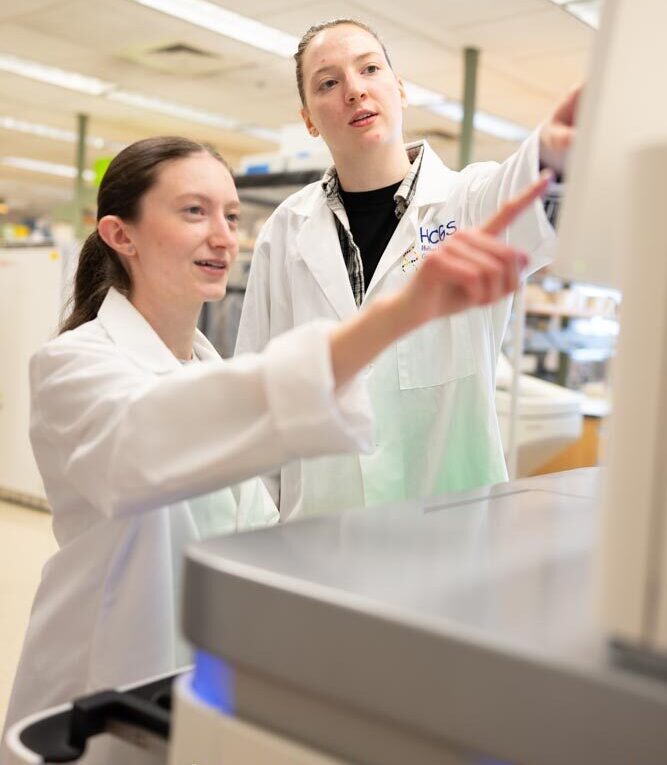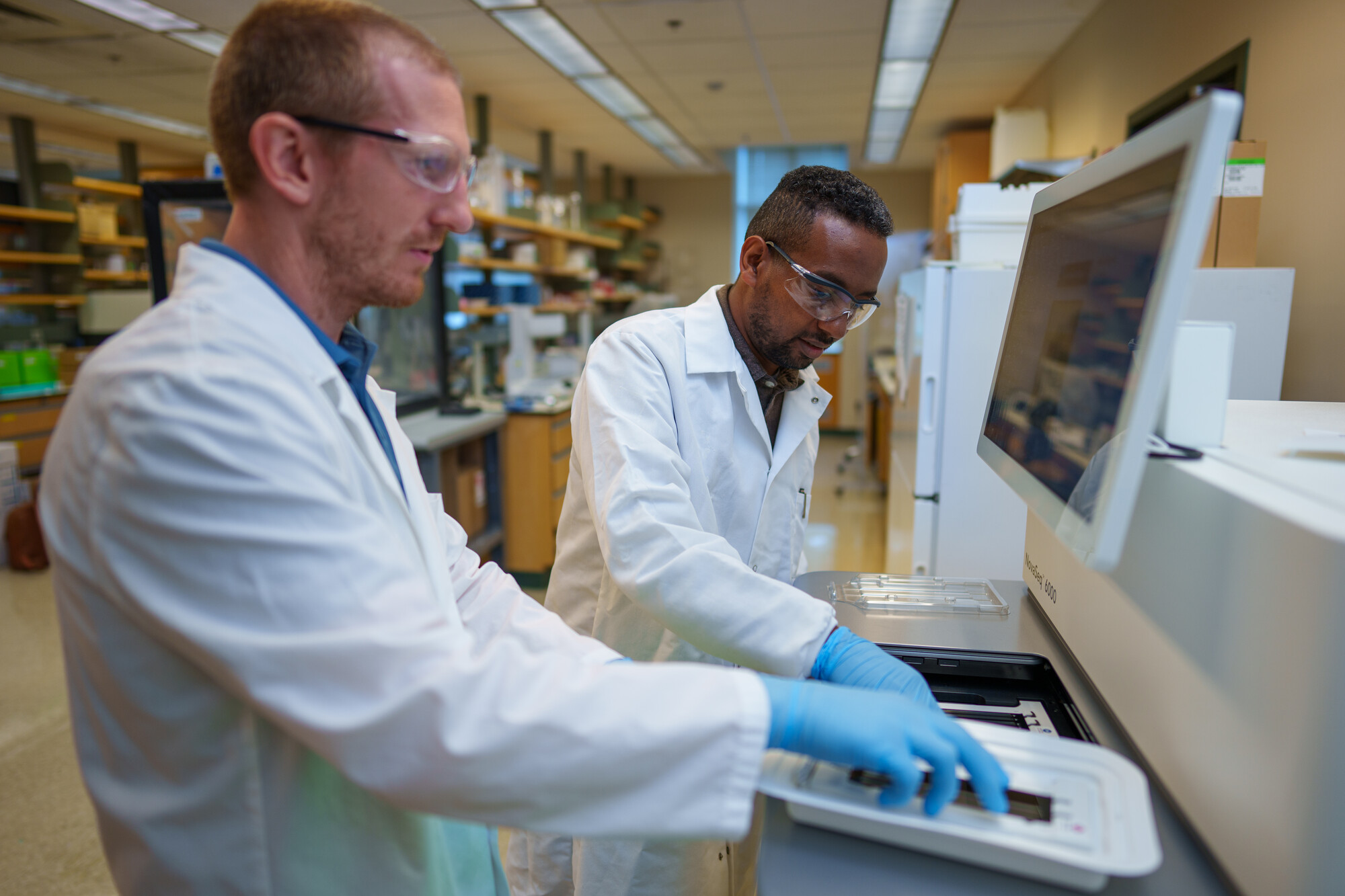Biotech and life sciences are driving breakthroughs, from cancer treatments to AI-driven drug discovery. Companies are investing heavily in innovation, creating opportunities for those with lab experience, computational skills, and industry knowledge. As the industry expands, so does the demand for experts who can translate research into real-world impact.
Careers in this field offer strong prospects, with bioprocess engineers, bioinformatics analysts, and genomics data scientist earning around US$100,000 and up to US$120,000 in the US.
If you’re looking to enter or advance your career in this dynamic industry, the University of New Hampshire (UNH) provides the ideal launchpad. Its industry-focused MS in Molecular and Cellular Biotechnology and MS in Bioinformatics programmes offer hands-on training, technical expertise, and industry connections — preparing students to lead the next wave of biotech innovation.
Driving innovation, solving global challenges
Nestled in the heart of New England, UNH stands as New Hampshire’s flagship public university and a recognised research powerhouse. Its labs and scientists are among the nation’s best, earning UNH a top research institution designation from the Carnegie Classification of Institutions of Higher Education. With a legacy of over 150 years, the university is known for its strong teaching, research, and hands-on experiences that connect students with faculty, as well as private and public sector partners.

The University of New Hampshire has been recognised as one of the nation’s top research institutions. Source: University of New Hampshire
A key part of this ecosystem is the College of Life Sciences and Agriculture (COLSA), one of five colleges on UNH’s picturesque Durham campus. Situated near Boston and the Massachusetts technology and life sciences corridors, the college offers unique opportunities to collaborate with leading biotech and pharmaceutical companies, positioning students at the forefront of industry advancements.
At COLSA, it’s about making an impact. Whether addressing diseases, restoring ecosystems, or combating food insecurity, faculty and students are committed to tackling some of the planet’s most pressing challenges. Through cutting-edge research and experience in labs and on the field, COLSA not only welcomes those eager to make a difference but also equips them with the skills and knowledge to turn that vision into reality.
Preparing for success in biotech and bioinformatics
The MS in Molecular and Cellular Biotechnology (MCBT) is a non-thesis programme designed to equip students with the knowledge and laboratory skills needed to fast-track their careers in the biotechnology and pharmaceutical industries. For Nicholas Zylinski, an MCBT student, one of the programme’s biggest strengths is the opportunity to connect with like-minded professionals, including researchers, professors, and peers who share his passion for molecular and genetic-based therapies.
“Communicating with brilliant and inspired professors and colleagues has helped me develop the tools to transition from academia into the real-world biotech and pharmaceutical industries,” he says.
This kind of face-to-face interaction is a big part of COLSA’s approach. Lab-based courses encourage engagement, helping students build the critical thinking and technical skills they need to succeed in biotech. Complementing this are internships with local and regional companies, graduate-level lab courses, and independent research opportunities in MCBT faculty laboratories.
Most students complete their degree in two semesters plus a summer research or internship experience, allowing them to quickly enter the biotech sector. “Our ability to help place MCBT students in internship experiences with biotech and pharma companies offers them a unique opportunity to understand what it’s like to work in the industry,” says Professor Rick Cote. “Many of our students find that their internship experience leads to a job offer from the company.”
Similarly, the MS in Bioinformatics prepares students for data-driven roles in biotechnology, pharmaceuticals, agriculture, environmental sciences, and biomanufacturing. Unlike a thesis-based MS programme, students take core and elective courses in genetics and genomics that are directly relevant to industry professionals.
“In my lab, for example, we are developing techniques to understand the structure of genomes, improve genome and transcriptome assembly, and relate physiology to underlying genomic patterns,” says Professor Matthew MacManes. “All of these require advanced data analytics techniques, and the courses students take prepare them to tackle these questions.”
The programme concludes with training in a research lab or industrial setting, which gives students real-world experience that will make them stand out in the job market.

University of New Hampshire’s cutting-edge facilities elevate the student experience. Source: University of New Hampshire
Where a UNH biotech degree can take you
UNH’s state-of-the-art facilities give biotechnology and bioinformatics students a competitive edge. With access to the Hubbard Centre for Genome Studies and the University Instrumentation Centre, biotechnology students train on industry-standard equipment, while bioinformatics students benefit from the cutting-edge technology at the Genome Centre and the Research Computing Centre.
Such exposure opens doors to various career paths. Graduates can work as research scientists in pharmaceutical and biotech companies, focusing on drug development, genetic engineering, or medical diagnostics. Others may pursue roles as bioinformatics analysts, using data-driven approaches to solve biological challenges in healthcare and agriculture.
Beyond industry roles, graduates can continue with advanced degrees in biotechnology, bioinformatics, or related fields. Whether entering the workforce or academia, UNH graduates have the skills and experience to thrive in the rapidly evolving biotech sector.
Learn more about University of New Hampshire.
Follow University of New Hampshire on Facebook, X, Instagram, YouTube, TikTok, and LinkedIn













